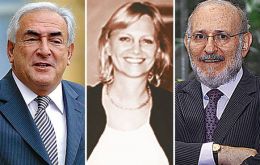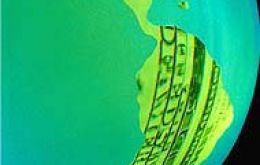MercoPress. South Atlantic News Agency
Economy
-
Tuesday, October 21st 2008 - 20:00 UTC
WTO reports leap in anti-dumping investigations
The number of investigations into the practice of dumping, or exporting a product at an unfairly low price, surged in the first half of this year, the World Trade Organization (WTO) reported this week.
-
Tuesday, October 21st 2008 - 20:00 UTC
UK public sector debt back to 1997 level: almost half of GDP
The takeover of Northern Rock has helped push the United Kingdom's public sector debt to almost half of gross domestic product (GDP) in the last year, just off highs seen over a decade ago when Labour came to power.
-
Tuesday, October 21st 2008 - 20:00 UTC
Crisis will get Obama elected forecasts Lula da Silva

Brazilian President Lula da Silva believes the ongoing financial crisis will lead to the election of Democrat Barack Obama as US president.
-
Monday, October 20th 2008 - 20:00 UTC
Dutch government with 13.4 billion USD stake in ING bank

The government of the Netherlands has said it will invest 13.4 billion US dollars in banking and insurance company ING Groep NV to boost its capital position.
-
Monday, October 20th 2008 - 20:00 UTC
IMF head investigated over sex scandal with employee

The International Monetary Fund is investigating allegations that its chief, Dominique Strauss-Kahn, had an improper relationship with a female employee. IMF lawyers have opened an independent probe into the charges, first reported Saturday by The Wall Street Journal.
-
Monday, October 20th 2008 - 20:00 UTC
UK unemployment forecasted 5% as recession advances

The United Kingdom is already in a recession which could last for three quarters and will see unemployment rising to 5%, according to the Ernst & Young ITEM club, reports the British press.
-
Sunday, October 19th 2008 - 20:00 UTC
World summit between US and EU to fight cash crisis

The presidents of the US, France and the European Commission have unveiled plans for a series of summits to discuss the global financial crisis.
-
Sunday, October 19th 2008 - 20:00 UTC
Strong confidence message from Latam central bankers

Latinamerican Central bank presidents and leading economists said on Sunday the region is well prepared to face growing global financial turbulence and agreed to share information on monetary and financial markets.
-
Sunday, October 19th 2008 - 20:00 UTC
Suspended death sentence for corrupt Beijing vice mayor
A former Beijing vice mayor in charge of overseeing Olympic construction projects has been given a suspended death sentence for corruption, a court said Sunday, in a stern warning to wayward Communist officials.
-
Friday, October 17th 2008 - 20:00 UTC
JPMorgan becomes US largest bank; displaces Citigroup

JPMorgan Chase & Co has become the largest US bank by assets surpassing long-time leader Citigroup Inc. On Thursday Citigroup Inc reported it ended September with 2.05 trillion US dollars of assets, while a day earlier JPMorgan led by Jaime Dimon, said it ended the month with 2.25 trillion US dollars.
